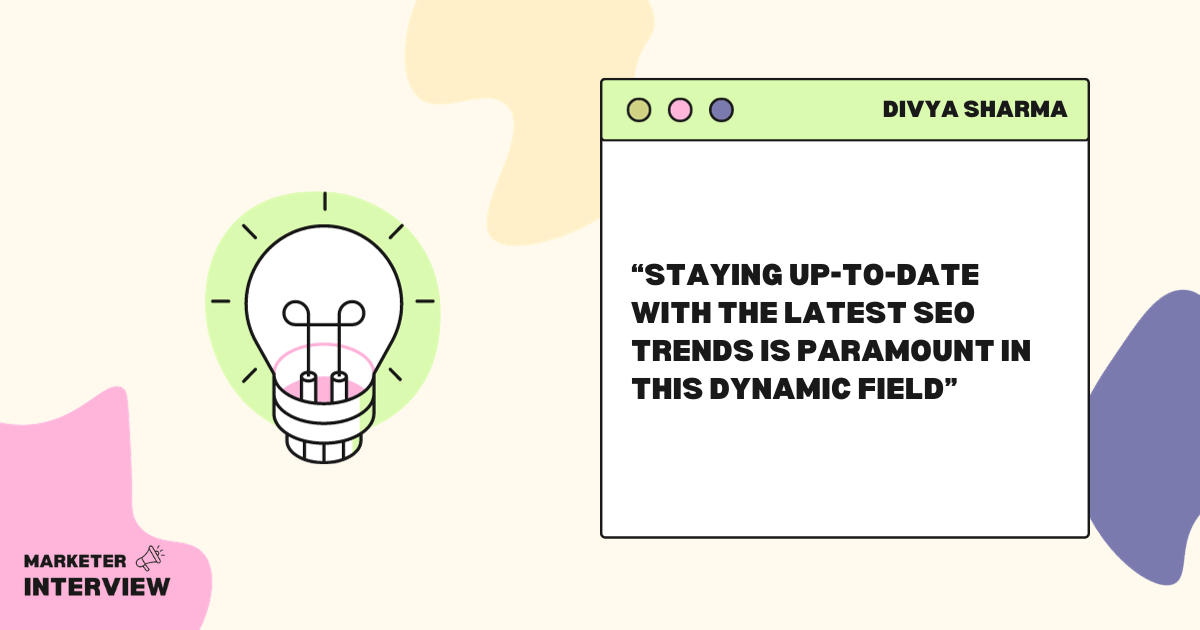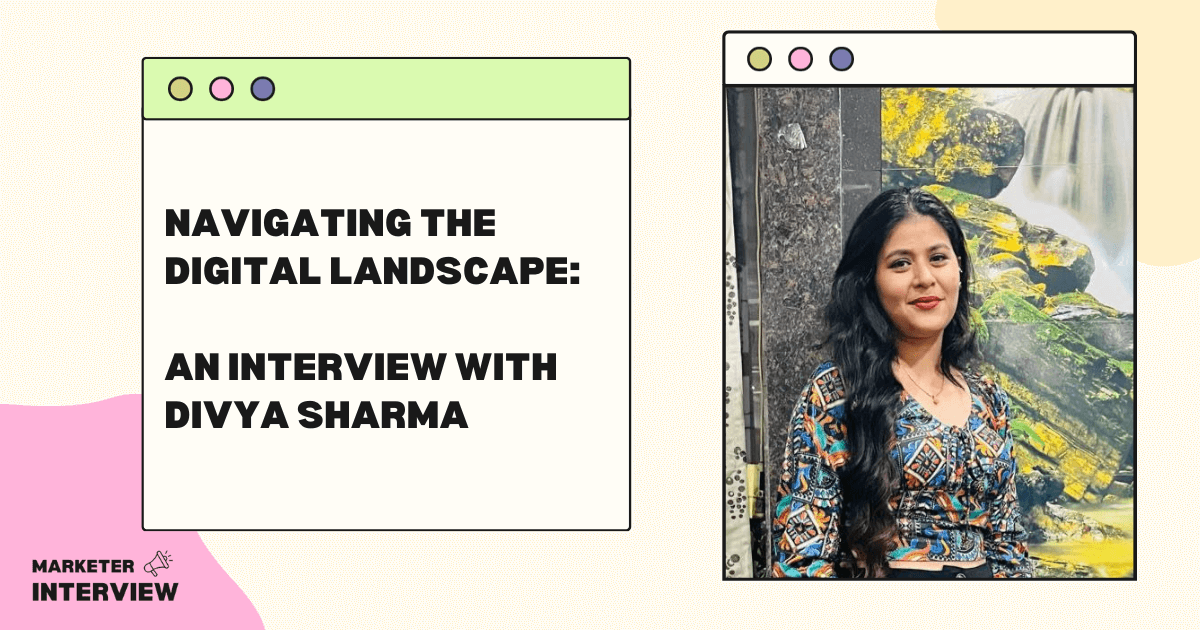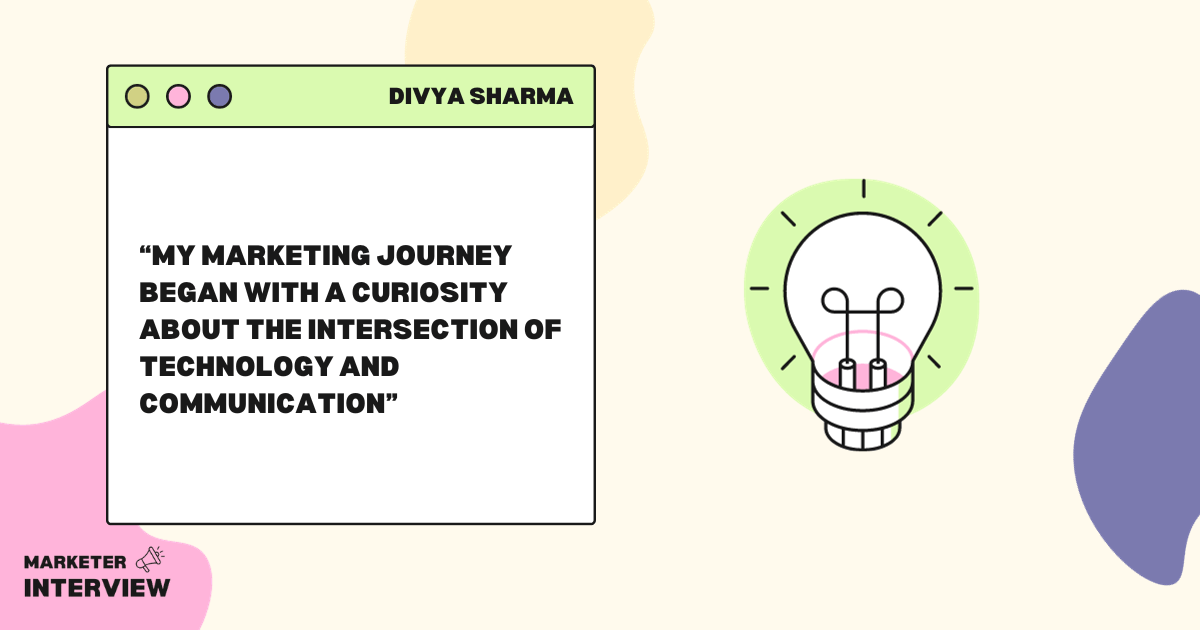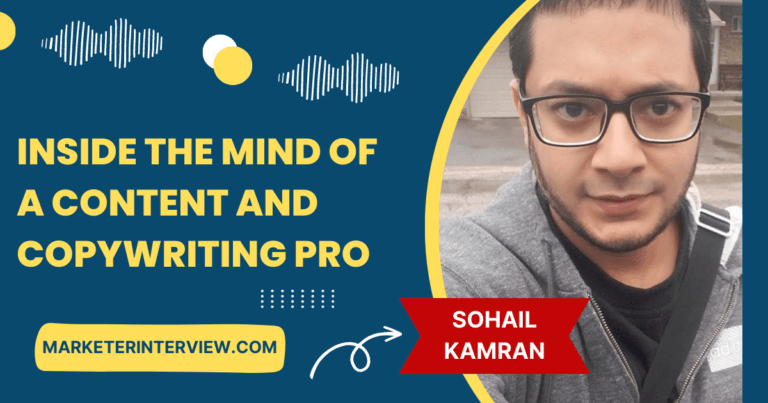Navigating the Digital Landscape: An Interview with Divya Sharma
Welcome to Marketer Interview, the go-to platform for insights into the dynamic marketing world.
Today, we have the privilege of speaking with a distinguished marketer, Divya Sharma, a Senior SEO professional at India Today Group.
Join us as we explore her journey, career, and insights into the ever-evolving marketing field.
Contents
- 1 How did you first get into marketing, and what motivated you to specialize in SEO and content?
- 2
- 3 As a Senior SEO professional, you’ve likely seen the industry evolve. What are the most significant changes you’ve witnessed, and how have you adapted?
- 4 Tell us about your role at India Today Group. How does SEO fit into your daily responsibilities, and what strategies have proven successful for you and your team?
- 5 SEO is constantly changing with algorithm updates. How do you stay up-to-date with the latest trends, and what advice do you have for marketers looking to navigate this ever-changing landscape?
- 6 You mentioned expertise in UI/UX. How does user interface and experience tie into your SEO work, and how has it impacted your campaigns?
- 7 Leadership plays a crucial role in marketing teams. What leadership strategies have you found effective in managing and inspiring your team to achieve their best results?
- 8 Are there specific tools or software that are indispensable in your role as a Senior SEO professional? Can you recommend any must-have resources for fellow marketers in your niche?
- 9 Content is a significant component of SEO. What are your tips for creating high-quality, SEO-friendly content that resonates with your target audience?
- 10 What memorable successes or campaigns in your career are you most proud of, and what lessons did you learn from them?
- 11 The marketing field is highly competitive. What strategies do you employ to keep yourself and your team motivated, innovative, and at the forefront of the industry?
- 12 As a seasoned marketer, what’s your vision for the future of SEO, and what exciting trends or developments do you anticipate in the coming years?
How did you first get into marketing, and what motivated you to specialize in SEO and content?
My marketing journey began with a curiosity about the intersection of technology and communication. While my educational background provided a strong foundation in computer science, I became increasingly interested in how technology influences user behavior and online interactions.
After completing my B.Tech, I decided to explore the realm of digital marketing. The transition wasn’t seamless, but it was driven by a desire to bridge the gap between technical expertise and effective communication in the online space.
As a Senior SEO professional, you’ve likely seen the industry evolve. What are the most significant changes you’ve witnessed, and how have you adapted?
The SEO industry has seen substantial changes over the years. One of the most significant shifts has been the increasing emphasis on user experience (UX) and the evolving algorithms of search engines like Google.
Here are a few notable changes and how I’ve adapted to them,
- Mobile-first indexing: The growing use of mobile devices has led search engines to prioritize mobile-friendly websites. This meant optimizing websites for mobile responsiveness became crucial.
- Algorithm Updates: Search engines frequently update their algorithms. Staying updated and adapting to these changes is crucial. I made it a point to educate myself continuously.
- Voice Search and AI: The rise of voice search and AI assistants like Siri and Alexa has influenced search behavior. I’ve adapted by optimizing content for voice search and keeping an eye on AI advancements that might impact SEO in the future.
Tell us about your role at India Today Group. How does SEO fit into your daily responsibilities, and what strategies have proven successful for you and your team?
In my role at India Today Group, SEO is a core component of our digital marketing strategy. I’m responsible for ensuring that our content across various projects, including “The Lallantop” and regional initiatives, is easily discoverable by our target audience through search engines.
This involves several vital responsibilities: Keyword Research, On-Page Optimization, Off-Page SEO, Technical SEO, data-driven strategy based on competitors, etc.
Staying up-to-date with the latest SEO trends is paramount in this dynamic field. Here’s how I do it and my advice for fellow marketers:
- Continuous Learning: I make it a habit to follow authoritative SEO blogs, attend industry conferences, participate in webinars, etc.
- Networking: Connecting with fellow SEO professionals and exchanging insights is invaluable.
- Google’s Official Resources: Google often provides official guidance and insights. Keeping an eye on Google’s Webmaster Central Blog and Search Console is essential.
- SEO Tools: Utilize reputable SEO tools that offer insights and updates on algorithm changes and website performance
- Experimentation: Be willing to test new strategies and adapt to changes. SEO is a field where practical experience is invaluable.

You mentioned expertise in UI/UX. How does user interface and experience tie into your SEO work, and how has it impacted your campaigns?
UI/UX is closely intertwined with SEO. A positive user experience enhances SEO rankings and contributes to the overall success of digital campaigns. Here’s how it impacts our work:
- Bounce Rate: A well-designed and user-friendly website reduces bounce rates,
- Page Speed: Faster loading times improve user experience and SEO.
- Mobile-Friendliness: A responsive design that provides an excellent experience on mobile devices is crucial.
- Navigation and Content Accessibility: Intuitive site navigation and easy access to relevant content make it more likely that users will find what they’re looking for.
Leadership plays a crucial role in marketing teams. What leadership strategies have you found effective in managing and inspiring your team to achieve their best results?
Leadership is essential in fostering a productive and motivated marketing team. Here are some effective strategies I’ve found:
- Clear Communication: Open and transparent communication is critical.
- Empowerment: Give team members the autonomy to make decisions within their areas of expertise
- Lead by Example: Demonstrate a strong work ethic, dedication, and a commitment to continuous learning.
- Recognition and Feedback: Acknowledge and reward team members’ achievements.
- Goal Setting: Set clear, achievable goals aligning with the marketing strategy. Monitor progress and provide guidance.
- Training and Development: Invest in team training and development to keep them updated with industry trends and technologies.
Are there specific tools or software that are indispensable in your role as a Senior SEO professional? Can you recommend any must-have resources for fellow marketers in your niche?
There are several indispensable tools and resources for SEO professionals:
- Keyword Research Tools: Tools like Ahrefs, SEMrush, and Google Keyword Planner are essential for identifying high-impact keywords and analyzing search volume and competition.
- SEO Analysis and Audit Tools: Platforms like Moz, Screaming Frog, and DeepCrawl help in technical SEO analysis, site audits, and issue detection.
- Analytics Platforms: Google Analytics and Google Search Console are fundamental for tracking website performance, user behavior, and search engine insights.
- Backlink Analysis Tools: Tools like Majestic and Monitor Backlinks assist in monitoring and analyzing backlinks for link-building strategies.
- Content Optimization Tools: Tools like Yoast SEO and SurferSEO help optimize content for SEO by providing on-page recommendations.
Content is a significant component of SEO. What are your tips for creating high-quality, SEO-friendly content that resonates with your target audience?
Creating content that is both high-quality and SEO-friendly is crucial for success. Here are some tips:
- Keyword Research: Conduct thorough keyword research to understand what your target audience is searching for. Use tools like Ahrefs or SEMrush to identify relevant keywords.
- User Intent: Align your content with user intent.
- Engaging Headlines: Craft compelling and click-worthy headlines.
- Quality Content: Focus on creating well-researched, comprehensive, and valuable content.
- Multimedia Elements: Incorporate relevant images, infographics, and videos to enhance the overall user experience and keep visitors engaged.
- Internal Linking: Include internal links to relevant pages within your website. This not only improves navigation but also helps search engines understand the structure of your content.
- Mobile Optimization: Given the prevalence of mobile users, ensure your content is mobile-friendly for a seamless user experience.
- Regular Updates: Keep your content up-to-date and relevant. Periodically revisit and update older content to maintain its accuracy and usefulness.
- Social Sharing: Encourage social sharing by incorporating social media-friendly elements. Social signals can indirectly impact SEO.
What memorable successes or campaigns in your career are you most proud of, and what lessons did you learn from them?
In the news industry, real-time coverage & evergreen content is crucial. One particular success was during a major news event where our goal was to dominate search engine results and provide timely, accurate information & another is the top significant issue from the tech end.
Achievements:
- Topical Keyword Dominance: We secured top positions for relevant and trending keywords related to the event through meticulous keyword research and content optimization.
- Live Updates and Multimedia Integration: Implementing a strategy that included live updates, video content, and interactive elements enhanced user engagement and prolonged time spent on our news platform.
- Social Media Integration: Coordinating SEO efforts with social media teams ensured cross-channel visibility and increased our reach during the event.
The marketing field is highly competitive. What strategies do you employ to keep yourself and your team motivated, innovative, and at the forefront of the industry?
Staying motivated and innovative in the fast-paced marketing industry is crucial. Here are strategies I employ for myself and my team:
- Continuous Learning: Encourage a culture of continuous learning.
- Team Building: Foster a positive and collaborative team culture.
- Recognition and Rewards: Acknowledge and reward achievements, whether big or small.
- Innovation Workshops: Dedicate time for brainstorming sessions and innovation workshops.
- Flexibility and Autonomy: Allow team members the flexibility to explore new strategies and approaches.
- Cross-functional collaboration: Encourage collaboration with colleagues from different departments.
- Feedback and Improvement: Foster a culture of constructive feedback.
As a seasoned marketer, what’s your vision for the future of SEO, and what exciting trends or developments do you anticipate in the coming years?
The future of SEO holds several exciting possibilities. Here’s my vision and anticipation for the coming years:
- User Experience as a Ranking Factor: I foresee an even greater emphasis on user experience as a critical ranking factor.
- AI and Machine Learning Integration: Integrating AI and machine learning in search algorithms will become more sophisticated.
- Voice Search Optimization: With the increasing prevalence of voice-activated devices, voice search optimization will become imperative.
- Video SEO: Video content is already on the rise, and its importance will continue to grow. Optimizing video content for search engines will be a key focus, with enhanced video snippets and indexing.
- E-A-T (Expertise, Authoritativeness, Trustworthiness): Google’s emphasis on E-A-T will likely intensify.
- Local SEO Evolution: Local search optimization will evolve, focusing on hyper-local targeting and personalized local search results.
- Zero-Click Searches: The prevalence of zero-click searches (where users get the information they need directly from search results) will require SEO professionals to adapt their strategies to maintain visibility and engagement.
- Core Web Vitals: Google’s Core Web Vitals and page experience signals will continue to play a significant role in rankings. Prioritizing website performance and user experience will be paramount.







